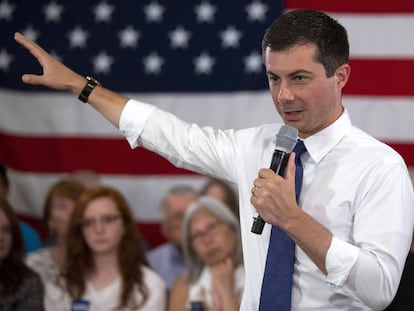Beto O¡¯Rourke: ¡°Impeachment is a sign that our democracy still works¡±
The Democratic presidential candidate from Texas speaks to EL PA?S about the need to remove Donald Trump from office, Mexico¡¯s importance as a US partner, and gun control
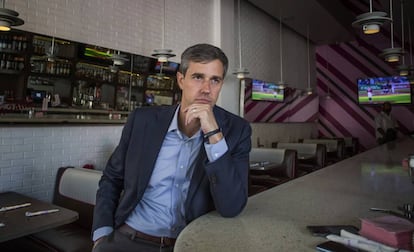

At a time when US President Donald Trump was doing everything he could to make the United States look toward Mexico, perhaps it made sense for someone from the border to go up against him. At least that¡¯s how Robert Francis O¡¯Rourke sees it. He¡¯s known as Beto to his friends, a very Mexican nickname that shows in just one word that he comes from a bilingual and bi-national world. Beto O¡¯Rourke (El Paso, 1972) was a Democratic member of Congress when he decided to contest the Senate seat held by the conservative Ted Cruz, in the very conservative state of Texas. It was a decision that brought him recognition across the US. O¡¯Rourke didn¡¯t win, but you could say he tied. In that election, the Democrats discovered in him a politician who spoke as if he were giving a motivational talk, who had the physical presence of actor Jimmy Stewart and charisma that reminded many of Robert Kennedy.
O¡¯Rourke?is now vying to be the Democratic Party¡¯s candidate for president. His popularity is undeniable, but with just three months to go to the Democratic primaries in Iowa, he is polling at 2%, which is enough for him to take part in the debates, but means he is far from being one of the favorites.
Beto O¡¯Rourke spoke with EL PA?S last Friday at a diner in West Hollywood, Los Angeles, as he stopped for lunch in the middle of a very hectic schedule. He takes his time to sit down and read the menu. It¡¯s a luxury for him: ¡°Normally I eat in the car,¡± he admits.
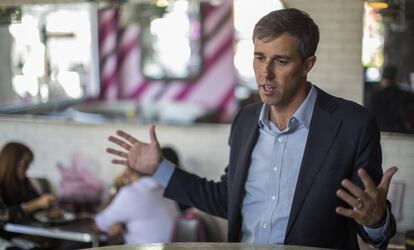
Question. When you decided to stand as a Democratic presidential candidate, the impeachment process hadn¡¯t begun. How has this impacted the campaign?
Answer. I think it's such a good sign that our democracy and our institutions still work. The president has committed these crimes and thus far has been able to do so with complete impunity. He¡¯s now going to be held accountable because of the work that the House [of Representatives] is doing, and frankly because of the outrage of so many of our fellow Americans. I don't know what it means for the campaign, and I'm not terribly concerned because the most important thing is for this country to be able to make it through the most challenging period we've had since the Civil War and come out the other side stronger and better with our democracy still intact. That is an open question right now.
Q. It appears you think there are going to be long-term sideeffects of this, whatever the outcome.
A. There's really a choice before us. Either we will decide some people are above the law, and so far the president really has been able to operate above or apart from the law, or that our institutions, our Congress, our democracy is going to work at its moment of greatest test. Whatever path this country takes will define us forever. I really do believe there's a very strong risk that we lose our democracy and lose what has made America really so exceptional. We don't always get it right, and we are not perfect, but this idea that we can freely choose the course that this country will take, imperfectly though it may be, we've really been able to pull this off for 243 years. Its future is going to be decided at this moment.
I believe there¡¯s a very strong risk that we lose our democracy and lose what has made America really so exceptional
Q. Are you concerned that the impeachment will monopolize the debate of ideas in the Democratic primaries? That nothing else will be discussed?
A. No, I think we should be talking about this. I can't think of something that is more important for the future of this country than deciding this question at this moment. I'm grateful. Anything else we want to do, rewrite our immigration laws, confront climate change, have a minimum wage that's a living wage, or healthcare for all, those things can only become possible if we can successfully resolve this crisis. My faith, or I wouldn't be doing this, is in the American people and that when called to do the right thing, ultimately we will do the right thing.
Q. You have changed the terms of the debate on guns in the Democratic Primary. Did you always believe in the mandatory buyback of assault weapons?
A. No, I didn't. As a member of the House I supported an assault weapons ban and I've tried to be a leader on this issue. To your question, [after the shooting in El Paso], and meeting mothers who had lost their children, meeting family members of those who had been grievously wounded, shot in the chest, shot in the stomach by someone who had an AK-47, a weapon of war, and hearing their stories and then hearing them ask me, ¡®Hey, what are you going to do to make sure this never happens again?¡¯ That absolutely changed me and reminded me that what's important is not how something polls or how popular it is, but whether or not it is the best and the right thing to do for this country. Calling for a mandatory buyback of assault weapons is the right thing to do for the country. It's the best thing we could do to save the lives of our fellow Americans from an epidemic of gun violence.
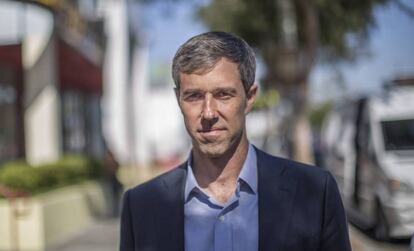
Q. What has prevented the Democrats from being more aggressive on this issue?
A. Fear. Fear of the NRA [National Rifle Association], fear of the politics, fear of the polling, fear of the consequences in the next election. You see from some candidates now [referring to Pete Buttigieg, mayor of South Bend and candidate in the primary, who has criticized the idea of mandatory buybacks] an effort to do what is safe, what will offend the least number of people and policy proposals on guns that are driven by polls instead of an interest in saving the lives of people. Also, freeing people from fear.
I think part of the reason that we've received so much support for taking this position is it's a position that most Americans held but maybe didn't think was possible and had not ever heard it in our politics before and are now grateful that someone is saying this. I can't explain why more Democrats are not supporting this, but most democratic voters out there, and in fact most Americans support this.
Q. You have made border culture a focus point. You're showcasing the culture of places such as El Paso to the rest of the country. How do you define that background? What does that give you?
A. It's a really interesting question because there's this political dynamic to it. This is the place, the US-Mexico border that the president is focusing so much fear and hatred and racism and violence, though it is one of the safest places in the United States of America today. Immigrants, asylum seekers pose no violent risk to this country. In fact, they're as desperate, as vulnerable as a human can be.
I think this is a great opportunity for our foreign policy to prioritize Mexico and Latin America
There at the US-Mexico border is where I live, where my wife, Amy, and I are raising our three kids, and from where I can tell what I hope is a very powerful story about communities of immigrants contributing far more than they could ever hope to take from this country, and how border communities are among the safest places in America today. Not despite, but because they're cities of immigrants and the sons and daughters of immigrants. I think that story, those facts, that message could not come at a better time for this country because you have a president who is using fear and paranoia and anxiety and directing violence against immigrants and people based on their country of origin. There's no other candidate who can offer this perspective and meet the president literally at the place that he is trying to drive so much fear and stand up for that community.
And there's the fact that the border is such a profoundly beautiful, amazing place geographically. The fact that just in our part of the border, Ju¨¢rez and El Paso formed this binational community of three million people. It is something where you can measure the amount of trade, the jobs, the safety of El Paso. My kids are in public schools in El Paso, their math class is taught in Spanish today. Monday it'll be taught in English. Dual-language education, making the most of who we are. That's something that I want to share as well.
Q. Was everything fine at the border before Trump?
A. No. There you go. Absolutely. What were the problems that made Trump possible? The fact that Democrats have been talking about immigration reform for 30 years and have not done anything. In fact, Democrats voted for the border wall, 600 miles of it have already been built, it wasn't just Republicans. It's not just Donald Trump. Democrats have their fingerprints all over that wall that has produced death from those who are trying to cross into this country. It has also given President Trump the opportunity to say, ¡®Look, it's not just me. Democrats have done this as well.¡¯ Or the internal deportations from the United States under the last administration.
We have borne the brunt of paranoia and fear and racism before this president. I think what we have to do now is unapologetically, without being defensive about who we are, say here are the right things to do: Legalize America, 10 million people here, many of whom are working the toughest jobs in this country. Make them legal. Make dreamers US citizens. Make legal permanent residents US citizens by waving their citizenship fees. Make it easy to travel here, to join family, to work a job, to go to school, to flee persecution and not have to wait in line from Mexico for 20 or 25 years.
This is a first for Democrats, without saying ¡®In order to do all these things, I'll give you the wall. In order to do all these things, I'll deport a bunch of people.¡¯ No. We're not going to do any of that stuff. We're going to do what is right. You are right to say that our lack of progress over the last 30 years has harmed border communities, but it has also given Donald Trump an opportunity to say, ¡®You know what? These guys haven't done anything. I'll build a wall. I'll stop the flow of immigrants and asylum seekers.¡¯ It¡¯s the wrong answer to the question, but until we answer that question with action, we're going to continue to get that.
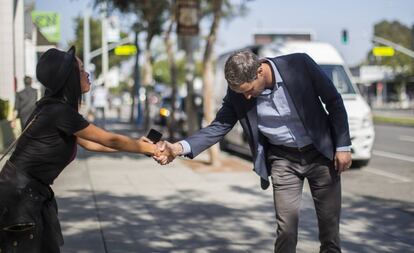
Q. How do you see the relationship with Mexico, not as a resident from El Paso but as the possible president?
A. I cannot think of a more important relationship for America, whether measured in trade volumes or the fact that six million Americans owe their jobs to US-Mexico trade, to the fact that we make and produce things. Culturally, demographically, from family, our histories, we're literally joined at the hip. We couldn't leave each other if we wanted to. We have to see in Mexico an equal partner on working on bi-national issues, but also on working on Venezuela, working on the northern triangle of Central America, working in this hemisphere to make sure that we really have a chance to lead, to make sure that people don't have to travel 2,000 miles to this country to flee their own. Work on true global priorities like climate change. Let's work with Mexico to ensure that we're partners in this. As president, that relationship would be my priority. I would also ensure that our focus when it comes to foreign affairs is on the Americas. We are fighting wars half a world away that we've been in for nearly 20 years now. We've taken our eye off the ball in this region to the point that tens of thousands of people showed up at our front door at the Texas-Mexico border, and it was a surprise to us! I think this is a great opportunity for our foreign policy to prioritize Mexico and Latin America.
Q. You mentioned climate change. Climate change has become key to this campaign, much more than in the past. Do you think it¡¯s issue that could mobilize voters?
Border communities are among the safest places in America today
A. We'll see. Right? My sense is the answer is yes. That whether you're a Republican or a Democrat, you care about your children or grandchildren and the generations that follow, and you understand, if you believe the science, and I do, that you've got but 10 years left within which to act or to lose their future forever. Young people who will inherit the consequences of our decisions, our action or inaction more than anyone else get this better than anyone else. I think you'll see not only their leadership on forcing the conversation, but you'll see their leadership at the polls. I'm encouraged. Yes, I think it will change this election.
Q. What does it say about America that Donald Trump could win the Republican nomination in 2016 and then the election?
A. When we fail to make progress on immigration, or when we fail to ensure that you can work one job and not have to work a second or third or fourth, when we fail farmers who are growing the food upon which we depend, when we fail communities that feel forgotten or left behind, or people can't see a doctor or take their child to a therapist, or afford the ability to be well enough to go to work or to lead their lives or to raise their children, then we open the opportunity to someone like Donald Trump who can play upon justified anger and frustration. ¡®See, this shit doesn't work. You all have given them a chance, and we haven't seen the change that you want.¡¯ Then his appeal to blow up the system or to disregard our institutions or even the rule of law, becomes more appealing. The way I think we answered this question is not only in saying very clearly what it is we will do, but by all means, taking that action and improving the lives of our fellow Americans. We close the door to demagogues who use that justified anger and frustration and direct it at immigrants, at ethnic minorities, at some of the most vulnerable people in our country. I think that's one of the lessons that we should take from 2016.
Q. I understand from the answer that those conditions which allowed Trump to win the election are all still in place.
A. Yes. Until we make changes and then can point to the change. I'll give you one quick example. We were in a small community in rural Texas. Half of rural Texas cannot get online, there's no rural broadband internet in those places. I was talking about the need for the federal government to partner with those communities to extend broadband internet. This guy raises his hand and he says: ¡®Look, I was in first grade in 1937. In that year, the federal government with Democratic leadership, FDR [Franklin D. Roosevelt] and Lyndon Baines Johnson, the congressman at the time, partnered with our community to extend electricity through the Rural Electrification Administration. That meant that my life had value, that our community mattered. I had the ability to read just like the kids in LA or Chicago or London or Tokyo.¡¯ He said, ¡®From that day forward, my dad was a yellow-dog Democrat.¡¯. In other words, when Democrats showed up and delivered and made sure that we knew that we counted, then we were loyal to them going forward. We've got to be very honest and clear about what's happening in this country and why it's happening. Very decisive in the action that we propose, and then we've got to lead and get it done, or we're going to have more of what we're seeing right now.
Tu suscripci¨®n se est¨¢ usando en otro dispositivo
?Quieres a?adir otro usuario a tu suscripci¨®n?
Si contin¨²as leyendo en este dispositivo, no se podr¨¢ leer en el otro.
FlechaTu suscripci¨®n se est¨¢ usando en otro dispositivo y solo puedes acceder a EL PA?S desde un dispositivo a la vez.
Si quieres compartir tu cuenta, cambia tu suscripci¨®n a la modalidad Premium, as¨ª podr¨¢s a?adir otro usuario. Cada uno acceder¨¢ con su propia cuenta de email, lo que os permitir¨¢ personalizar vuestra experiencia en EL PA?S.
?Tienes una suscripci¨®n de empresa? Accede aqu¨ª para contratar m¨¢s cuentas.
En el caso de no saber qui¨¦n est¨¢ usando tu cuenta, te recomendamos cambiar tu contrase?a aqu¨ª.
Si decides continuar compartiendo tu cuenta, este mensaje se mostrar¨¢ en tu dispositivo y en el de la otra persona que est¨¢ usando tu cuenta de forma indefinida, afectando a tu experiencia de lectura. Puedes consultar aqu¨ª los t¨¦rminos y condiciones de la suscripci¨®n digital.

